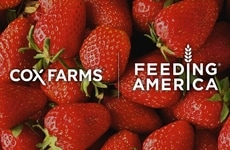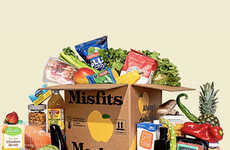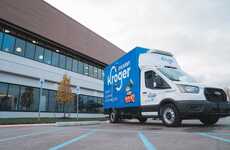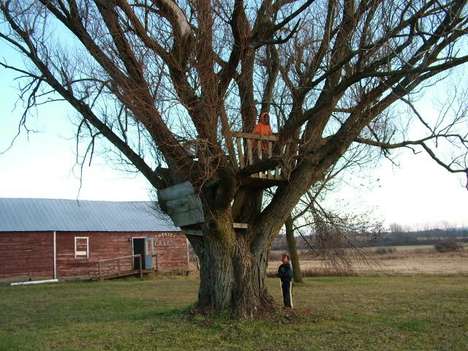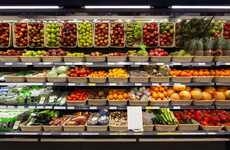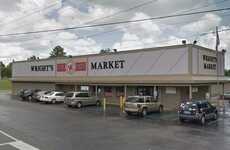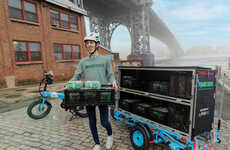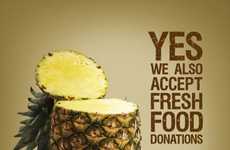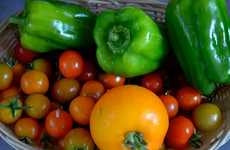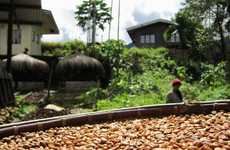
The Corbin Hill Road Farm Supplies Fresh Produce to Those in Need
Tiana Reid — November 10, 2011 — Social Good
References: corbinhillfarm & facebook
The Corbin Hill Road Farm is a social enterprise addressing the lack of availability of fresh foods for low-income communities. The initiative attempts to reimagine the connections between farmers, consumers and investors; reinforce the relationship between urban and rural communities; and foster economic citizenship and community. The business model centers on creating "strategic partnership clusters" that work to form an entire system for producing, distributing and consuming healthy foods.
Catering to the South Bronx, a New York City neighborhood with high rates of poverty, obesity and diabetes, the Corbin Hill Road Farm speaks to the problem of affordability and availability of healthy foods. South Bronx resident Judith Raphael told the New York Times that there is a dearth of options in her neighborhood: rotting potatoes at the bodega or yellowing broccoli at the grocery store. "People might not buy a bag of oranges because it’s too expensive, but that doesn’t mean they don’t want to cook a good dinner," she said.
According to the Centers for Disease Control and Prevention, the term "food desert" refers to "areas that lack access to affordable fruits, vegetables, whole grains, low-fat milk, and other foods that make up the full range of a healthy diet." Obviously, the lack of access to nutritious foods can have a detrimental impact on overall well-being, and furthermore, can have long-term impacts because even if healthier food options are made more accessible, many customers still choose nutrition-less foods due to the life-long creation to preferences.
Corbin Hill Road Farm was established by New School professor and community organizer Dennis Derryck who recognized the links between the South Bronx and Schoharie County -- two disparate worlds. Derryck had the program's sustainability in mind when he bought the 92-acre farm in Schoharie. "He’s developed a commercial community-supported agriculture plan (C.S.A.) that lets residents determine what they’ll get, with an enticing prize at the end for people who stick with it: a chance to own shares in the farm," wrote Kim Severson in the New York Times.
One of the products that Corbin Hill Road Farm currently offers is a winter food share that contains a monthly supply of 15 to 25 pounds of long-lasting seasonal produce. Food share prices are determined based on a sliding scale according to income, and typically, customers pay two weeks in advance.
In many ways, this initiative is akin to the movement of community-supported agriculture (CSA), an alternative food network that often offers boxed shares of food products, however, CSAs typically caters to more affluent neighborhoods. The Corbin Hill Road Farm promotes food justice through impact-driven solutions that merge rural communities, urban consumers and healthy produce.
Contact Information:
Corbin Hill Road Farm Website
Corbin Hill Road Farm on Facebook
Corbin Hill Road Farm on Twitter
Catering to the South Bronx, a New York City neighborhood with high rates of poverty, obesity and diabetes, the Corbin Hill Road Farm speaks to the problem of affordability and availability of healthy foods. South Bronx resident Judith Raphael told the New York Times that there is a dearth of options in her neighborhood: rotting potatoes at the bodega or yellowing broccoli at the grocery store. "People might not buy a bag of oranges because it’s too expensive, but that doesn’t mean they don’t want to cook a good dinner," she said.
According to the Centers for Disease Control and Prevention, the term "food desert" refers to "areas that lack access to affordable fruits, vegetables, whole grains, low-fat milk, and other foods that make up the full range of a healthy diet." Obviously, the lack of access to nutritious foods can have a detrimental impact on overall well-being, and furthermore, can have long-term impacts because even if healthier food options are made more accessible, many customers still choose nutrition-less foods due to the life-long creation to preferences.
Corbin Hill Road Farm was established by New School professor and community organizer Dennis Derryck who recognized the links between the South Bronx and Schoharie County -- two disparate worlds. Derryck had the program's sustainability in mind when he bought the 92-acre farm in Schoharie. "He’s developed a commercial community-supported agriculture plan (C.S.A.) that lets residents determine what they’ll get, with an enticing prize at the end for people who stick with it: a chance to own shares in the farm," wrote Kim Severson in the New York Times.
One of the products that Corbin Hill Road Farm currently offers is a winter food share that contains a monthly supply of 15 to 25 pounds of long-lasting seasonal produce. Food share prices are determined based on a sliding scale according to income, and typically, customers pay two weeks in advance.
In many ways, this initiative is akin to the movement of community-supported agriculture (CSA), an alternative food network that often offers boxed shares of food products, however, CSAs typically caters to more affluent neighborhoods. The Corbin Hill Road Farm promotes food justice through impact-driven solutions that merge rural communities, urban consumers and healthy produce.
Contact Information:
Corbin Hill Road Farm Website
Corbin Hill Road Farm on Facebook
Corbin Hill Road Farm on Twitter
Trend Themes
1. Food Justice - Creating sustainable and equitable access to affordable and healthy food options for low-income communities.
2. Community-supported Agriculture (CSA) - Providing a direct connection between farmers and consumers through subscription-based models, fostering a sense of community and supporting local agriculture.
3. Food Deserts - Addressing the lack of availability of affordable and nutritious foods in specific geographic areas, leading to health disparities and socio-economic challenges.
Industry Implications
1. Social Enterprise - Leveraging business models to create positive social and environmental impact, specifically focusing on addressing food injustice and improving access to fresh produce.
2. Urban Farming - Utilizing urban spaces to grow and distribute fresh produce, combating food deserts and promoting sustainable and local food systems.
3. Nonprofit Organizations - Supporting initiatives and programs that aim to improve food access, equity, and nutrition in underserved communities, working collaboratively with stakeholders to drive positive change.
3.6
Score
Popularity
Activity
Freshness



